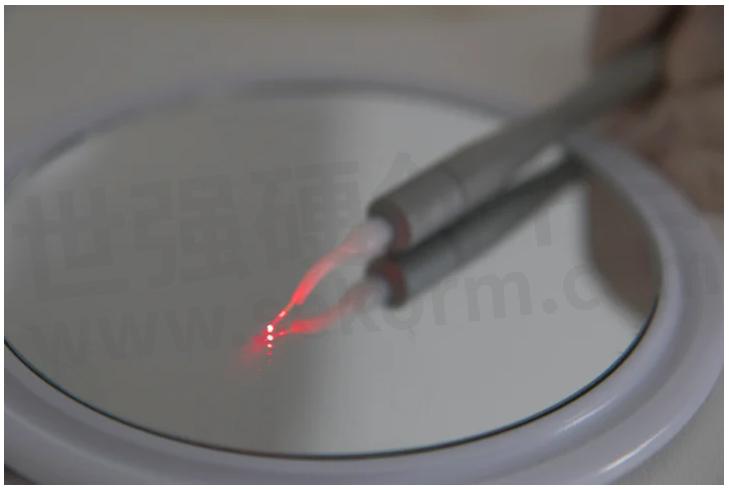Body Temperature Sensors with Precise Temperature Control for Medical Laser Devices




Despite how common they've become for patient treatment, the use of lasers as a surgical tool seems like something out of science fiction. Regardless, laser-assisted surgery is indeed here, and it represents a significant advancement in delivering extremely precise medical care.

However, laser-assisted surgery also brings new metrics that must be closely monitored, particularly temperature control. Put simply, without precise and immediately reactive temperature control via body temperature sensors, it’s impossible to guarantee the safety and effectiveness of laser-assisted surgery.
BODY TEMPERATURE SENSORS & SURGICAL LASER DEVICES: A NECESSARY PAIRING
Compared to traditional surgeries of just a few decades ago (which relied on incisions with scalpels and sutures to close the wound) the use of lasers allows for minimally invasive procedures with fewer risks of complications and shorter recovery times.
However, the concentrated beam of light that is the laser delivers an intense amount of heat – something the human body is not designed to withstand extended and unchecked exposure to.
In fact, surgical lasers can reach temperatures of up to 1,000℃. In the most basic sense, just like in critical care, precise temperature control is critical to avoid thermal damage to surrounding tissues during laser surgeries. The risks of thermal damage during laser surgeries cannot be overstated.
When temperatures exceed certain thresholds, cells can suffer irreversible damage, leading to scarring, nerve damage, and other serious injuries. In addition, temperatures that exceed safe ranges pose a threat to the medical professionals using laser surgical devices – just like the patient, the surgeon isn't impervious to extreme and prolonged exposure to heat.
Robust and reactive body temperature sensors allow surgeons and their teams a mechanism for more accurate patient temperature monitoring and control during laser-assisted surgeries.
TYPES OF TEMPERATURE SENSORS USED IN LASER SURGICAL DEVICES
While temperature monitoring in laser-assisted surgeries is critical for patient safety, there are a variety of temperature sensors that can be used depending on their device-specific application as well as the level of monitoring precision required.
In a general sense, body temperature devices used in laser-assisted surgeries fall into two categories: contact and non-contact, each representing a variety of temperature sensor types.
Thermistor – a type of resistor that exhibits a large and predictable change in resistance in response to changes in temperature. They are often used in temperature measurement and control circuits because they are highly sensitive to small changes in temperature, but can be susceptible to self-heating effects.
Thermocouples – temperature sensors that are made up of two wires of different metals that are welded together at the sensing end. When this junction is exposed to a temperature differential, it produces a voltage that is proportional to the temperature difference. Thermocouples are often used in high-temperature applications because of their durability and accuracy.
Resistance Temperature Detectors (RTDs)– made of a metal wire, usually platinum, that changes resistance as its temperature changes. They are very accurate and stable over time, but are generally slower to respond to changes in temperature compared to thermocouples and thermistors.
NON-CONTACT TEMPERATURE SENSORS
Infrared Temperature Sensors – Using infrared light to measure the temperature of an object or surface without making direct contact, this sensor works by detecting the thermal radiation emitted by the object and converting it into an electrical signal.
Fiber Optic Temperature Sensors – With optical fibers these sensors monitor changes in the physical properties of their fiber optic cable as temperature changes. The fiber optic cable is typically coated with a material that changes its refractive index as temperature changes, which alters the way light is transmitted through the fiber. This change in light transmission can be measured to determine temperature. Fiber optic medical temperature sensors are often used in harsh environments because they are immune to electromagnetic interference.
TEMPERATURE MAPPING IN LASER SURGERIES
While the data provided by a body temperature sensor during a laser-assisted surgery is invaluable, it's only half the picture of heat’s presence.
As its name indicates, temperature mapping is the process of creating a real-time presentation of the temperature in various areas of a patient’s body during laser surgery. While its focus is the immediate area where the laser is being used, it also looks at those nearby that might be affected by the beam's heat or the beam itself.
To perform temperature mapping during surgery, two main techniques are used: imaging and catheter-based temperature mapping.
Imaging techniques use specialized cameras to capture the changes in temperature during surgery. These cameras are designed to detect thermal emissions from the body and display the temperature in false colors on a computer screen, allowing physicians to visualize the temperature distribution and adjust the laser settings accordingly. In a very literal sense, imaging techniques is heat vision.
Catheter-based temperature mapping involves inserting a thin catheter into the body during surgery to take temperature readings at different locations. These catheters are equipped with custom miniature sensors that detect changes in temperature and transmit this information to a computer in the operating room. This technique provides more accurate temperature measurements in specific areas of the body but can be invasive and may require additional time.
APPLICATIONS OF TEMPERATURE SENSORS IN LASER SURGERIES
Despite being a newer method for patient treatment, laser-assisted surgery is finding its place as an effective way to deliver precise and highly accurate medical care. Its applications in healthcare have taken a few forms:
LASER ABLATION
During this procedure, a high-intensity laser beam is directed at the targeted tissue, causing it to heat up and vaporize. This process allows surgeons to remove tissue with a high degree of precision, without damaging surrounding healthy tissue so long as temperatures and heat exposure are carefully monitored and adjusted.
Surgical laser ablation can be used in a variety of procedures, including the removal of skin lesions and tumors, as well as treatments for cancers such as:
Prostate cancer
Breast cancer
Liver cancer
What's more, it's a minimally invasive procedure that can offer patients a faster recovery time and reduced risk of complications compared to traditional surgical techniques.
COSMETIC SURGERIES
While not as serious as other procedures, laser-assisted cosmetic surgery is a growing field. Many non-invasive laser procedures have become very popular in recent years, and some of the most common include:
Hair removal
Lipolysis
Skin resurfacing
Rhinoplasty
Like ablation, cosmetic laser surgery also boasts a faster recovery time and less of a chance for complications during and after a procedure.
ENDARTERECTOMY
During this procedure, a surgeon uses a laser to remove plaque buildup from the inner lining of an artery, restoring blood flow and reducing the risk of heart attack or stroke. The laser is directed through a catheter, a thin tube inserted into the artery through a small incision.
Laser-assisted endarterectomy can offer several advantages over traditional surgical techniques, including:
Reduced blood loss
Less damage to surrounding tissue
A shorter recovery time
BODY TEMPERATURE SENSORS: MAKING LASER SURGERIES POSSIBLE
With technology changing almost every aspect of patient care, these are interesting times to see the evolution in how treatment is delivered.
The use of laser-assisted surgery is an incredible advancement in medicine, but it requires precise temperature control to ensure safety and effectiveness. Body temperature sensors are the key component that makes this possible and, most importantly, safe.
- |
- +1 赞 0
- 收藏
- 评论 0
本文由上山打老虎转载自Amphenol Sensors Blog,原文标题为:BODY TEMPERATURE SENSORS FOR MEDICAL LASER DEVICES,本站所有转载文章系出于传递更多信息之目的,且明确注明来源,不希望被转载的媒体或个人可与我们联系,我们将立即进行删除处理。
相关推荐
Fast Response Times and Accurate Readings Temperature Sensors‘ Important Role in Critical Care
Temperature sensors help medical professionals perform their life-saving work through fast(er) response times and accurate readings of a patient‘s condition or a device‘s performance. Amphenol‘s temperature sensors can be used in cardiac care, skin surface, dialysis, respiratory care, thermometry, and so on.
Ever-increasing Need for Custom Miniature Medical Sensor in Critical Care
The trend of miniaturization is changing patient care for the better with smaller medical devices allowing more advanced treatments. As technology continues to advance in medicine, custom miniature sensors will become an even more essential component of many critical care devices.
Amphenol Sensors Electric Car Battery Packs-A New Power Source
Amphenol Sensors‘ Electric car battery packs paired with the appropriate sensor technology, electric vehicles open new doors to remote and emergency power supply that’s efficient, safe, and long-lasting.
Amphenol Sensors(安费诺)温度传感器/MEMS压力传感器/C〇2、湿度、灰尘传感器选型指南
目录- Sensors Temperature Sensors Pressure Sensors CO2, Humidity & Dust Sensors
型号- DK SERIES,NDP SERIES,NHQ SERIES,AAS-AQS-UNO-RH-CO2,RL40,T5D SERIES,FMA SERIES,GC32,EC95,AB6 SERIES,RL45,GC16,GT SERIES,DKM SERIES,CTP65,M SERIES,UD20,S SERIES,CTP60,RL30,AIT SERIES,GE-1935,TH SERIES,NDL SERIES,3006,MELF,YS4019,RL35,HM SERIES,GE-2102,GE-2103,JS2945,T6715,T6613-X,AAS-AQS-UNO,TM SERIES,R85 SERIES,SM-UART-04L,YSM SERIES,FP10,NPI-15,T6715-X,FP14,NPC-120,HS12SP,NPI-19,B35 SERIES,T6713,BB07,SUF SERIES,NK SERIES,BB05,YS4020,T6703,YSM 4021,YR SERIES,BR16,A-1737,BR14,T6700,BR11,T SERIES,FP07,1403,NHQM,P85 SERIES,ZTP SERIES,JF SERIES,NDK SERIES,JS8741,NPH SERIES,JS8746,R100,JR SERIES,PTSM,MA400,SM-PWM-01C,JB SERIES,1803,BB11,B05 SERIES,T6616,EVAP,YF SERIES,JA SERIES,P100,YD SERIES,YH SERIES,MF65 SERIES,YG SERIES,MA100,JIC SERIES,YB SERIES,B43 SERIES,T9602,NPC-100,YA SERIES,YC SERIES,SC30,CTP100,BR23,T6613,PTD SERIES,PTE SERIES,YM120,HVAC,JTC SERIES,JTR SERIES,MS SERIES,YK SERIES,WTF083B001,P30 SERIES,YL SERIES,YP SERIES,PTA SERIES,PTH SERIES,ND SERIES,B07 SERIES,PTF SERIES,PTO SERIES,P60 SERIES,JM SERIES,YS SERIES,T6600,RL1004,BR32,JS6780,JI SERIES,HS30P,JW SERIES,A1447-A1450,JS SERIES,TP SERIES,JE SERIES,JC SERIES,GE-1856,1703,B14 SERIES,T6615-X,GE SERIES,R65 SERIES,DC95,JYA SERIES,T3000,EVAP A1424,SC50,BR42,A-1266,C100,GE-1923,NPP-301,706 SERIES,2006,NKA SERIES,AS SERIES,B10 SERIES,P25 SERIES,NHQMM,GC11,RL20,CL SERIES,P20 SERIES,GC14,GE-1920,NPC-1220,JP SERIES,P65 SERIES,ES SERIES,CTP85,T6713-X SERIES,BR55,MC65,KU SERIES,TK95,NDM SERIES,R60 SERIES,NDU SERIES,NPC-1210,TC SERIES,JL SERIES,RL14,JD SERIES,RL060628,RL10
商用航空航天传感器解决方案
描述- Amphenol Sensors作为传感器技术和测量解决方案的领先创新者,提供多样化的标准定制产品,应用于航空航天领域。其产品涵盖温度、压力、气体、速度、位置、流体水平、声学、振动、倾斜和电流传感器,应用于飞机结构、航空电子设备、引擎、燃料系统、机舱环境等。Amphenol Sensors通过不断集成和提升传感器技术,为下一代解决方案提供支持。
HVOR传感器解决方案
描述- Amphenol Sensors提供多样化的传感器解决方案,涵盖温度、压力、气体、湿度、尘埃/颗粒物、电流、天气站、遥测控制单元、被动进入/启动、位置/速度/倾斜、水平、组合、声学、流量、加速度等。这些传感器应用于农业、农场、建筑等重工业领域,旨在提高设备效率、操作员安全和环境合规性。产品包括燃料处理系统、驾驶室舒适系统、安全系统、HVAC、底盘、动力总成、发动机管理和后处理系统等。Amphenol Sensors提供高精度、高稳定性、快速响应时间的传感器,适用于恶劣环境。
EV Heat Pumps & Enhanced Battery Life
One such component contributing to improved battery efficiency is EV heat pumps. Considered a new tool for increased battery life, EV heat pumps are providing the alternate route for improved efficiency and range.
AmphenolSensors(安费诺传感器}温度传感器 解决方案
描述- Thermometrics温度传感器产品线为Amphenol Advanced Sensors提供超过70年的技术经验,专注于设计和制造高质量的传感器。产品包括从芯片到增值组件,适用于-196°C至1150°C的温度范围。Thermometrics传感器广泛应用于航空航天、交通运输、商业、医疗和消费者领域,提供温度测量、控制和保护解决方案。产品包括温度扫描系统、防冰系统、环境控制系统、安全系统、冷却液/传动液压力/温度、排气温度、空气质量、发动机管理、仪表盘显示器、商业和家用设备等。Thermometrics还提供校准服务,包括主要温度标准和NIST校准服务。
型号- NTC,PTC
工业过程控制传感器解决方案
描述- Amphenol Sensors提供多样化的传感器解决方案,涵盖温度、压力、气体、湿度、振动、速度与位置、液位和流量等传感器,应用于工业过程控制。产品包括锅炉控制、流体温度、调节/炉子控制、流体压力、电机监控、泵监控、流体处理设备监控、接近传感、距离测量、气体压力、气体泄漏、气体浓度、工艺废气、气体流量控制、湿度、机器状态监控、机器人、工厂自动化、人机界面(HMI)、导航系统、自动导引车(AGV)、操纵杆等。传感器具有高精度、稳定性、耐用性,适用于恶劣环境,并提供定制化选项。
Keeping Cool with Data Center Temperature Sensors
Data center temperature sensors are the eyes and ears of your climate control system. These tiny devices provide real-time data on temperature and some insight into potential humidity levels throughout your facility. They come in various forms, each suited to different applications.
电子商城
现货市场
































































































































































































登录 | 立即注册
提交评论